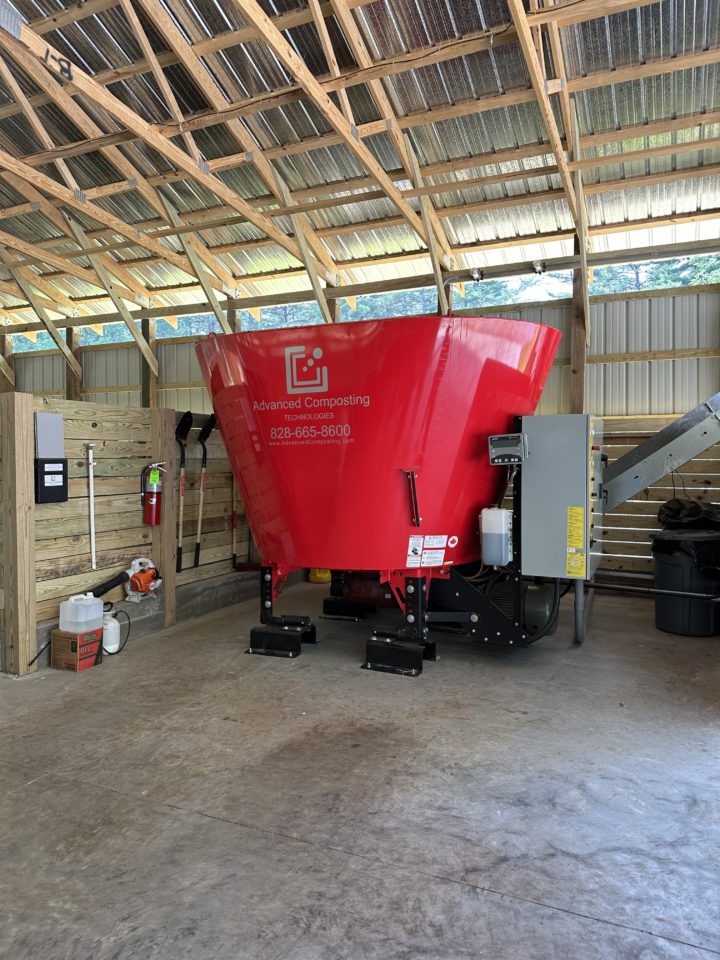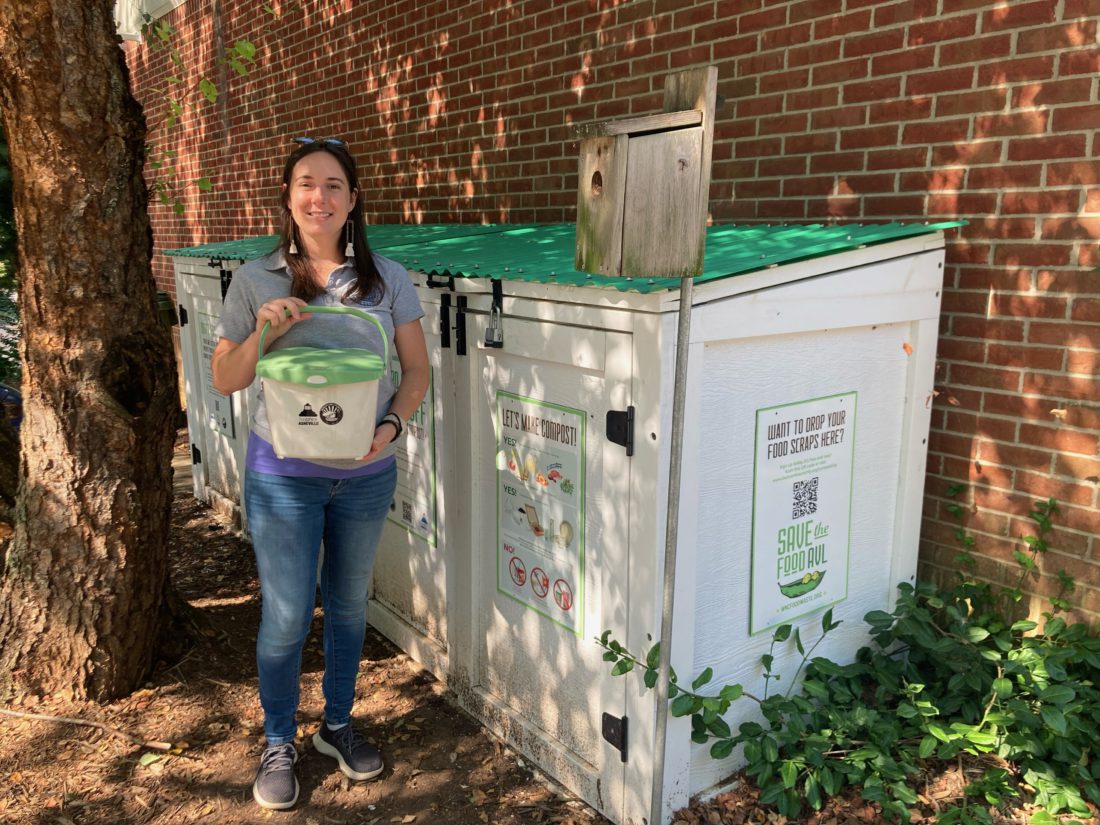There would be no bananas without their peel, carrots without their top or grapes without their vine. But home cooks often have little use for the organic packaging vital to the existence of a fruit or vegetable. The soil where the food originated, however, could use the nutrients that many people send to the landfill as trash.
Fortunately for the worms and microbes working hard to break down organic matter into soil, the popularity of composting is growing in Buncombe County, and government-sponsored food-scrap collection programs are helping some residents divert food waste from landfills.
Composting has a full circle of benefits, from limiting the volume of trash sent to the landfill and curbing methane emissions to feeding the soil in local farms and gardens, says Christine Wittmeier, the organics and recycling specialist for the Division of Environmental Assistance and Customer Service, part of the N.C. Department of Environmental Quality.
“Food production is a very resource-intensive industry. It takes water, fertilizer, land and energy to grow it, water it, harvest it, transport it and package it. And then for all of that to go to waste, because you know, someone didn’t eat it, that’s definitely also wasting all those resources that you use to get it there,” she says.
As Buncombe County and the City of Asheville cement their partnership to collect and divert food scraps and private haulers say business is booming, there’s still a long way to go to limit our residential organic trash print.
Approximately 800 tons of waste a day is deposited at the Buncombe County landfill, on average. A 2021 audit of the City of Asheville’s waste stream found that about 48% of waste from city facilities is compostable organic materials. For comparison, Danny’s Dumpster, the only compost processing facility that accepts food scraps from the public in Buncombe County, received about 1,200 tons of organic waste in all of 2021, according to data from the Department of Environmental Quality.
“When organics get buried in a landfill, it’s an anaerobic (oxygen-free) environment, and they release methane, which is a very powerful greenhouse gas,” Wittmeier says.
Any time organic material breaks down, it releases carbon dioxide and methane, but in a managed composting environment, unlike a landfill, the right mixture of material, moisture and rotation oxygenate the pile, limiting methane production.
Getting started
Composting was on Asheville’s radar early after volunteer-led WNC Food Waste Solutions Summits in 2017 and 2019 inspired the city to enter the National Resources Defense Council’s Food Matters Southeast cohort — joining Atlanta, Nashville, Tenn., and Orlando, Fla. — which came with about $33,000 of grant money.
A two-site pilot food scrap collection program launched in 2019 and has expanded to eight sites around Buncombe County, including five libraries.
“We’ve seen a really big success with this program in terms of participation and diversion. And we’ve gotten really good feedback from the residents,” says Casi Lohmeyer, recycling coordinator for Buncombe County’s Solid Waste Division.
She said about 6,000 people have signed up for the food scrap program, diverting 209 tons of food waste from the landfill so far.
While it’s fairly easy to compost plant material in the backyard, it takes more work to make sure animal products don’t attract scavengers, like rats and ants. The county’s program accepts meat and dairy products along with paper and plant-based items.
On the commercial side, Corner Kitchen and Chestnut have been composting for several years, says owner Joe Scully. As soon as he started a composting program, the weight of his restaurants’ trash decreased 30%, he says.
He estimates he sets aside about half a ton a week of compostable material for the compost processor.
“Our company has always been sensitive to the amount of waste that restaurants produce. And in the end, we really want to have a positive effect. So that’s why we started recycling and composting,” Scully says.
Where to compost
After the food scrap collection program got off the ground in 2021 at the city’s Stephens-Lee Recreation Center and the Buncombe County landfill, the city received $22,500 in a Community Waste Reduction and Recycling Grant from the Department of Environmental Quality, leading to an expansion in 2022.
Residents can take compost material to the following locations:
- Stephens-Lee Recreation Center
- Murphy-Oakley Community Center and Library
- West Asheville Library
- Skyland/South Buncombe Library
- East Asheville Library
- Leicester Library
- Transfer station on Hominy Creek Road
- Buncombe County Landfill
“We decided to partner with libraries, because they’re such central and integral community locations within neighborhoods, and they’re convenient to the public,” Lohmeyer says.
Each location, except Stephens-Lee, which had an enclosed shed, has wood compost structures built around three to four trash cans. The lids are locked with a padlock, each with the same code given out to participants when they sign up for the program.

Residents receive a free bin for food scraps to keep in their home that has a latching lid to limit odors, Lohmeyer says.
Pending a final contract with Danny’s Dumpster, the county expects to pay about $30,000 per year for the compost to be transported to the composting center.
Wittmeier says drop-off programs fill a gap for those that don’t have space or time for a garden but want to dispose of food scraps responsibly.
“I’m really glad to see food waste being mentioned more as a way that we can really make a big difference,” Wittmeier says. “We need to not only compost commercially, but we also need to get more homeowners to do it in their backyard. And I think that’s one great thing about this drop-off program. Not everyone has a yard. This allows people in apartments to compost easier.”
Private pickup services expand services
Compost Now, based in Raleigh, has been picking up food scraps from homes in Buncombe County since 2013, and recently expanded to Swannanoa and Black Mountain.
Kat Nigro, chief experience officer for Compost Now, says they seek to make it as easy as possible for people to keep their organic waste out of the landfill.
“Early on, we recognized that there was a large percentage of people who wanted to compost, or who were compost curious, but faced barriers that prevented them from composting. They either didn’t have the space to compost at home themselves, the time to commit to maintaining a composting system, or the experience and knowledge to compost effectively,” she says.
Hans Hegge says bears drove him to start Compost AVL in 2020 with his wife, Jessica. An active bear population around their Fairview home made a backyard compost pile risky. But it was important to them to limit what their family of five sent to the landfill.

“Jessica is proud that we only produce one bag of garbage in a week because of recycling and composting. She loved being able to filter food waste and paper products out of the landfill,” he says.
Compost AVL focuses on the more rural parts of Buncombe County and soon Haywood County.
Composting at the largest residence
The Biltmore Estate is also getting its hands dirty. It opened an in-house compost processing facility in March.
The facility, designed by Advanced Composting Technologies, which also designed a facility at Warren Wilson College, processed almost 13,000 pounds of food waste and about 36,000 pounds of manure in its first month, producing nearly 25 tons of finished compost which can be used as fertilizer for its crop fields and pastures, says Biltmore public relations manager Marissa Jamison.
“Composting is a vital part of the estate’s long-term sustainability vision. The composting program is part of our waste-reduction strategy to reduce Biltmore’s waste stream and the amount of material sent to the landfill,” she says.
Neither Biltmore nor Warren Wilson College’s compost programs are open to the public. Wittmeier believes this movement is just getting started, and she is hopeful compost bins will soon be commonplace in offices, homes and restaurants everywhere.
“I like to think composting is where recycling was 20 years ago. Now everybody’s very familiar with it in all of our offices, but that was not the case. [In 20 years] I think, hopefully, composting will be where recycling is now.”



Before you comment
The comments section is here to provide a platform for civil dialogue on the issues we face together as a local community. Xpress is committed to offering this platform for all voices, but when the tone of the discussion gets nasty or strays off topic, we believe many people choose not to participate. Xpress editors are determined to moderate comments to ensure a constructive interchange is maintained. All comments judged not to be in keeping with the spirit of civil discourse will be removed and repeat violators will be banned. See here for our terms of service. Thank you for being part of this effort to promote respectful discussion.